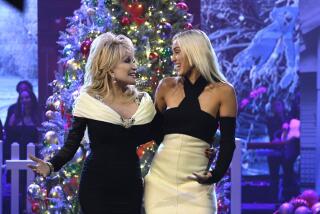The Grinch Who Returned Christmas
- Share via
The language of Christmas has hardly changed since Chaucer’s time.
That’s because the essence of this holiday is tradition, and change is resisted. We have carols and wassail and Christmas trees and the exchange of gifts, and nobody wants it any other way.
Now and then we see a pink Christmas tree, and it is probably plastic, but these trifling innovations don’t change the spirit of the celebration.
According to Merriam-Webster’s Ninth New Collegiate Dictionary, the words Christmas, yule, wreath, mistletoe, holiday, holly and angels date from before the 12th Century. Carol, Xmas and wassail are also many centuries old.
The word Christmas itself comes from the Old English word Christes maesse , which literally means Christ’s Mass , and it is celebrated throughout the Christian world on Dec. 25. In the first few centuries of the church, however, it was celebrated on various days in various months, because theologians disagreed on Christ’s birth date. Finally, in AD 340, the Pope settled on Dec. 25.
Webster’s sets at rest a common misconception about the word Xmas , which is often thought of as a sort of sacrilegious modern short-cut slang word for Christmas. Not so. The word Xmas has perfectly good credentials. The X in Xmas is a symbol for Christ from the Greek letter chi , the first letter of Christos. A chi looks much like our X , and the word Xmas has been in use since 1551.
Even so, it still looks like slang to me.
Yule, which also means Christmas, also dates from before the 12th Century, and is related to the Old Norse word jol , which originally meant a pagan winter feast. Yuletide first appeared in English in the 15th Century.
To “troll the ancient yuletide carol” is a tradition that dates to the singing of the “heavenly host” of angels on the first Christmas day: “Glory to God in the highest, and on Earth peace, good will toward men.”
C arol comes from the late Latin choraula , meaning choral song; it dates in English from the 14th Century. Troll means to sing, and comes from the 15th Century.
To go a-wassailing is to sing carols from house to house. Originally wassail was an Old Norse toast-- ves heill , meaning “be well”--and from that came the name of the cheerful cup made of wine, beer, cider, spices and sugar.
Few words have been added to the Christmas lexicon in recent centuries, but Scrooge--the born-again miser of Charles Dickens’ beloved story, “A Christmas Carol,” is an exception. Even more recently, the word grinch has become increasingly popular. A grinch is the ill-tempered cynic invented by Dr. Seuss in “The Grinch Who Stole Christmas.”
Decking the halls with leaves of holly originated among the ancient converted Danes. They believed holly was used for the crown of thorns at Christ’s Crucifixion, and that the red berries represented drops of blood.
The use of mistletoe goes back to the pagan Druids. It is a parasite that grows on apple and oak trees. Druid priests made a solemn rite of collecting it from oak trees. People paid them for pieces of the plant, believing that it kept witches away. The present notion that strangers may kiss under its aura is much more benign. (If the Druids were right, one is not in danger of kissing a witch.)
As for Santa Claus, that name is a corruption (through the Dutch Sinter Klaas) of St. Nicholas, a 4th-Century bishop of Myra, in ancient Lycia (Turkey), who was much beloved of children and sailors for his alleged miracles in their behalf. How this hazy figure became the jolly fat man who drives reindeer through the sky, squeezes down chimneys and leaves toys for children in millions of homes at Christmas is beyond my learning.
Anyway, I don’t believe in him, and I don’t think parents should con their children into believing in him. Children with normal intelligence will soon figure out that the old fellow is a fraud, and will never trust their parents again. This breach of faith at an age when children are entirely dependent on the parents for their perception of truth and reality can never be mended.
Mele Kalikimaka from your grinch.
More to Read
Sign up for Essential California
The most important California stories and recommendations in your inbox every morning.
You may occasionally receive promotional content from the Los Angeles Times.













